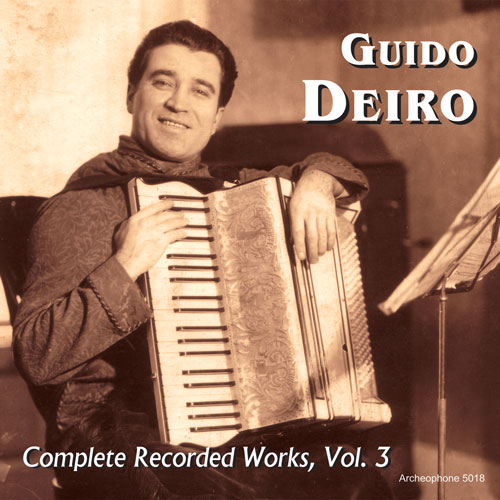
The third volume in our Complete Recorded Works of Guido Deiro picks up where Volume 2 left off, continuing his foray into popular material. The set features an increasing number of his own compositions (9 in total), including his signature song, "Kismet." The set includes a 24 page full-color booklet with notes and scholarship by accordion expert Henry Doktorski. List price: $16.49
OVERVIEW
- Catalogue number: ARCH 5018
- UPC: 778632904446
- Original release date: October 16, 2010
- Running length: 73:38 / 25 tracks
- Notes & packaging: Includes a 24-page full-color booklet
- Tracks recorded: 1917-1922
- Volume 3 of The Complete Guido Deiro
- In Archeophone’s Pioneers series
Sample all tracks
| Tracklist | ||||
|---|---|---|---|---|
| 1. | Hand Grenade Throwers March | Guido Deiro | 1917 | |
| 2. | La BohËme (Musetta’s Waltz Song) | Guido Deiro | 1917 | |
| 3. | I Pagliacci (Vesti la Giubba) | Guido Deiro | 1917 | |
| 4. | Madam Butterfly (Selections) | Guido Deiro | 1917 | |
| 5. | Tancredi Overture | Guido Deiro | 1917 | |
| 6. | Cavalleria Rusticana (Siciliana) | Guido Deiro | 1917 | |
| 7. | Poor Butterfly | Guido Deiro | 1917 | |
| 8. | Hong Kong | Guido Deiro | 1917 | |
| 9. | My Little China Doll | Guido Deiro | 1917 | |
| 10. | Marines’ March | Guido Deiro | 1918 | |
| 11. | Lola One-Step | Guido Deiro | 1918 | |
| 12. | Jazz Band Ball | Guido Deiro | 1918 | |
| 13. | Ostrich Walk | Guido Deiro | 1918 | |
| 14. | Royal Flying Corps | Guido Deiro | 1918 | |
| 15. | Temperamental Rag | Guido Deiro | 1918 | |
| 16. | Karavan | Guido Deiro | 1920 | |
| 17. | Kismet | Guido Deiro | 1920 | |
| 18. | Blue Diamonds | Guido Deiro | 1920 | |
| 19. | Neapolitan Polka | Guido Deiro | 1920 | |
| 20. | Tesor Mio | Guido Deiro | 1920 | |
| 21. | Zampa Rag | Guido Deiro | 1920 | |
| 22. | Western Stars | Guido Deiro | 1920 | |
| 23. | I’ll Keep on Loving You | Guido Deiro | 1921 | |
| 24. | Crooning | Guido Deiro | 1921 | |
| 25. | Stars | Guido Deiro | 1922 | |
The third volume in our Complete Recorded Works of Guido Deiro is the best to date. It shows off the master craftsman at his musical best, confident and assured. The set features an increasing number of Deiro’s own compositions (9 in total), including his signature song, “Kismet.” The set includes a 24-page full-color booklet with notes and scholarship by accordion expert Henry Doktorski, along with revealing essays by Guido’s son, Count Roberto Guido Deiro.
The Mature Deiro
Guido returned to the studio in 1917, newly separated from budding starlet Mae West, as a mature and confident musician. We don’t hear a man brooding or sad but, rather, a craftsman putting his best foot forward. The selections are mostly bright, cheerful, challenging, and played adeptly. Pieces such as “Hand Grenade Throwers March,” “Royal Flying Corps” and “Marines March” show off Guido’s unique knack for march music, while “Lola,” “Temperamental Rag,” and “Zampa Rag” demonstrate the master’s singular ability to compose and perform rags–a skill his brother Pietro said that Guido had more than any of his peers.
Noteworthy Adaptations of the Classics
The accordion was regarded during Deiro’s time less as a kitschy novelty, more as a wonder of engineering. It was a symphony in a box. So naturally Guido played his clever adaptations of the classics to great effect. Listen to “Musetta’s Waltz Song from La Boheme” and compare to the earlier version Guido recorded. You can hear his development and maturity exuding. Then there are the staples: “Vesti la Giubba from I Pagliacci,” “Siciliana from Cavalleria Rusticana,” and “Tancredi Overture,” some of the most popular operatic arias of all time, given unforgettable interpretations.
Moving with the Times
“Jazz Band Ball” and “Ostrich Walk” are by the Original Dixieland Jass Band, and Guido proves his versatility and adaptability by tackling the iconic jazz tunes with aplomb. “Karavan” is another selection by a jazz-age composer, Rudy Wiedoeft, the flipside selection to one of Guido’s all-time biggest hits, “Kismet,” an inclusion from early cinema that remains a popular tune to this day. Guido also tried his hands at several dance-band fox-trot numbers, such as “Blue Diamonds,” “I’ll Keep on Loving You,” “Crooning,” and “Stars.” He always varies his performances with clever inventions.
Personal Items
The attractive booklet features some striking photos from Count Deiro’s personal collection, never before seen by the public. The son has further contributed a touching reflection on his dad’s “Giving Something Back” to his adopted country during the Great War, and an essay that attempts to understand “The Rise and Fall of the Piano-Accordion.”
Pristine Sound
This volume of Guido Deiro’s Complete Recorded Works is the favorite of its producers. The sound we achieved is clear and clean, wide open and showing unusual depth in the acoustic recording process. You musicians out there will be especially gratified. Grab this one while you can.
This release is included in the following packages.
Save 20% on our entire catalogue
